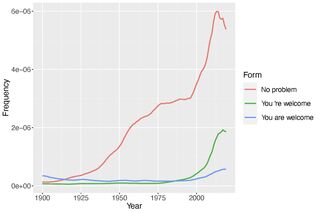Gratitude
Why So Many Assume "You're Welcome" Is Insincere
Is "no problem" any better?
Posted July 10, 2022 Reviewed by Kaja Perina
Key points
- Linguistic research tracks patterns in how thanks is articulated.
- “You’re welcome” doesn't always come across as polite anymore.
- The positive politeness orientation of “You’re welcome” can make it seem snarky or braggy.
- The alternative phrase "No problem" reflects the fact that offsetting a sense of imposition or obligation is now a cultural norm.
Nothing annoys like doing a good deed—say, opening a door or letting someone cut in front of you to keep up with their group—without receiving any acknowledgment. And that’s exactly when it’s most likely to come out: The sarcastic “you’re welcome.”
But when did ‘you’re welcome” go from being a polite gratitude response to a snarky retort when feeling slighted? Only since newer expressions of gratitude like “no problem” have opened the door for “you’re welcome” to take on a different sense.
Incoming Thanks
When looking at the pattern of how we respond to thanking over the past 50 years, there are two things that are striking. One is the rise of the phrase “no problem” as a popular alternative to “you’re welcome,” and the second is the fact that, despite the feeling that “you’re welcome” is fading fast from our lips, there is not overwhelming evidence that this is indeed the case.
In fact, when looking at research on “you’re welcome,” studies still show it as the most popular response to “thank you” for Americans (Dinkin 2017, Schneider 2005). And checking in on its popularity over time, a google Ngram shows its use increasing (in written form) since about 2000, not decreasing (although this doesn’t pull out different uses for the term).

We also find a lot of evidence that the expression “No problem” is used more frequently today than 50 or 100 years ago. Just enter it into the google Ngram viewer and you’ll see that there was a meteoric rise in the occurrence of the expression starting in the early 1900s.
Of course, this doesn’t separate out the uses that have nothing to do with thanking—for instance when telling one’s boss it will be no problem getting your report in on time—but it does suggest that this is a relatively new and increasingly popular phrase this century in response to things like thanking and requests. And the same studies that looked at the use of “you’re welcome” also found quite a bit of “no problem” on the contemporary thanking scene.
So, in essence, it seems we have a case of both “you’re welcome” and “no problem” co-existing to serve the same purpose—namely, responding to a thank you.
Two Too Many?
When a language has two words or phrases that do the same thing, then often they take on different nuances of meaning depending on the associations they might have had running in the background in situations of their use.
For “no problem,” it has taken on the meaning of downplaying any sense of incurred obligation. In other words, saying “no problem” rejects the idea that there is any need for thanks. As an example, think about a teenager who finally empties the dishwasher after being reminded several times. Dad says thank you out of politeness, though it was clearly expected behavior. If the kid answers with “no problem,” Junior’s reply recognizes this expectation rather than acting like they did dad a favor.
In contrast, “you’re welcome,” which research suggests is sometimes perceived as more formal, carries the sense of expressing appreciation of the acknowledgement that a favor was done. This type of politeness—directed toward making people feel appreciated—is known as positive politeness.
The problem? In some contexts, like the example above, this can make one seem a bit snarky, braggy or gloating—especially since negative politeness, or the need to offset imposition or obligation, has become a more prominent cultural norm over the 20th century. Saying “you’re welcome” doesn't do much in this regard.
So, it is this gloating self-aware sense—especially when not given our appreciative due—that seems to have been embraced by comedians, social influencers and late-night talk show hosts, as well as anyone feeling a bit slighted by not enough gratitude. And now, “no problem” and “no worries” are around as potentially better options when one thinks “you’re welcome” might be misconstrued or come off as self-aggrandizing.
A Welcoming Future?
There is not much research yet on whether this new take on “you’re welcome” might be part of what is driving its apparent increase in the google corpus in the 2000s. However, a recent study on thanking responses in the U.S. by linguist Aaron Dinkin suggests that, among younger speakers, “you’re welcome” is not as popular as a thanking responder compared to older speakers. So, it very well may be that the sarcastic or gloating use is increasing as the thanking use is decreasing, especially among those less long in the tooth.
But this doesn’t mean that it will lose its old meaning as a genuinely polite phrase. Dinkin’s study still indicated that “you’re welcome” was the most likely response when responding to more elaborate thanks (e.g., thank you so very much vs. thanks). But to a more casual “thanks,” “you’re welcome” might come across as snarky while “no problem” doesn’t have, well, the same problem.
So, yes, there might be some sarcasm behind the “you’re welcome,” but don’t lose hope; there is often still a lot of gratitude, too.
Facebook/LinkedIn image: M2020/Shutterstock
References
Aijmer, Karin. 1996. Thanking. In Conversational routines in English: Convention and creativity. London et al.: Longman. 33-79.
Dinkin, Aaron. J. 2018. It's no problem to be polite: Apparent‐time change in responses to thanks. Journal of Sociolinguistics 22(2): 190-215.
Schneider, Klaus P. 2005. ‘No problem, you’re welcome, anytime’: Responding to thanks in Ireland, England, and the U.S.A. In Anne Barron & Klaus P. Schneider (eds.), The pragmatics of Irish English. Berlin & New York: Mouton de Gruyter. 101–139.




